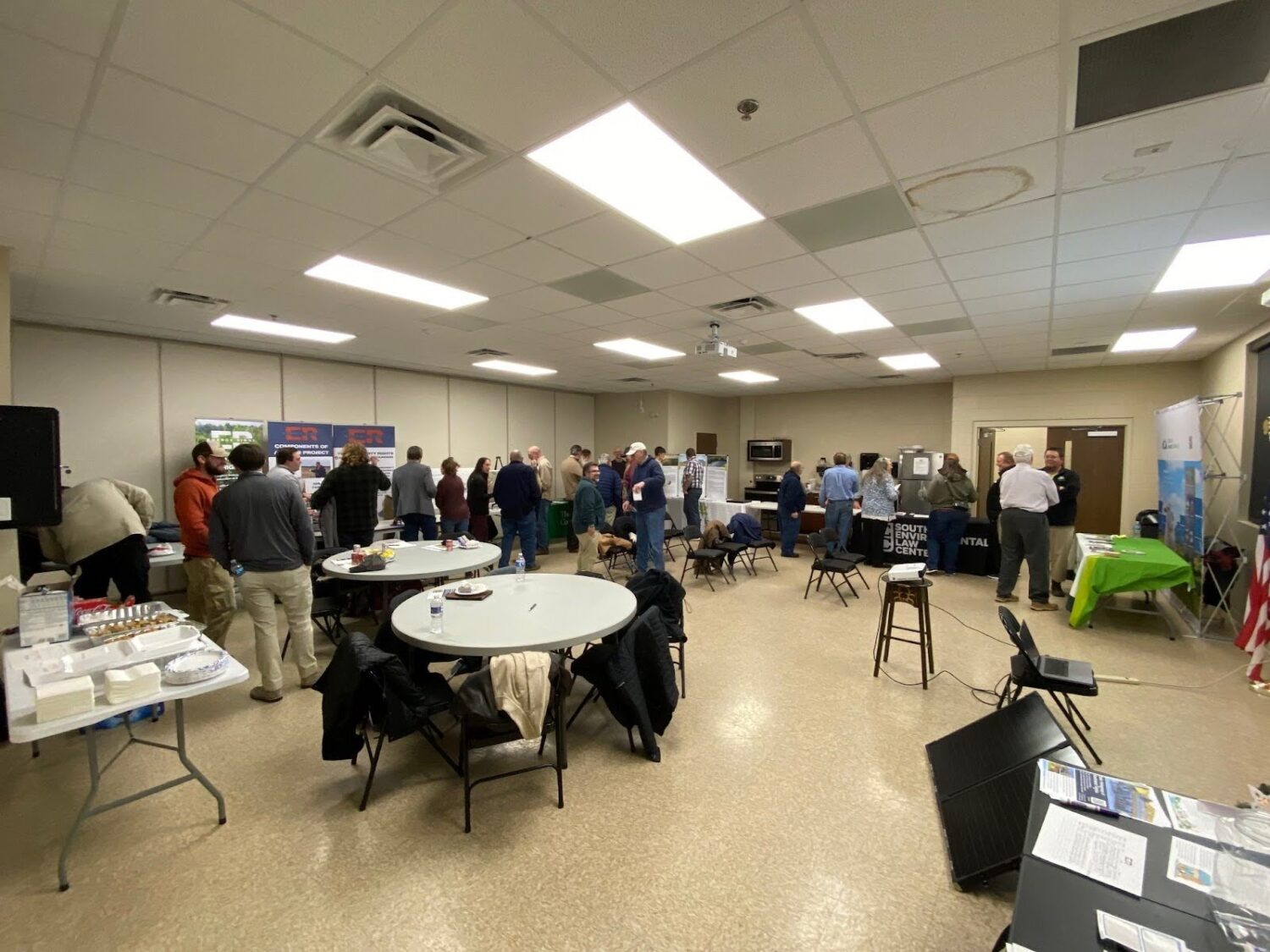|
|
|
HAPPY FRIDAY
December 6, 2024
|
|
|
|
We hope you’ve stayed warm this week! This week our team traveled far and wide across the Commonwealth on our mission for
Clean Energy the Right Way.
|
|
|
|
|
|
RUSSELL COUNTY COMES TOGETHER FOR A SOLAR 101
|
 |
|
|
|
Energy Right is committed to being a participant in every discussion regarding solar energy throughout the Commonwealth of Virginia. As a part of this commitment, we strive to create opportunities for communities to discuss solar while also providing them with fact-based resources. Whether a community is new to solar developments or involved for some time, it is essential to provide opportunities for learning and to align future projects with local priorities.
On December 3rd, Energy Right hosted a “Solar 101” event in Russell County, Virginia, in partnership with the Solar Workgroup of Southwest Virginia. This event provided community leaders and members with a general overview of solar energy generation, followed by opportunities to engage with experts in the field more specifically. Attendees had the chance to speak to industry professionals, researchers, farmers, and legal experts to explore how solar projects can benefit their community while discussing factors for the success of future projects.
Engaging with and listening to communities is vital for ensuring that effective solar projects are developed in Virginia. By hearing and addressing the concerns of community members, we can offer specific solutions and answers. Collaborating closely with localities enhances the level of positive impact that future projects will have on their host communities.
|
|
|
|
|
|
|
|
|
|
|
|
At a Crossroads in Solar Permitting
|
|
|
|
|
As we have endeavored to share, explain, and warn, the commonwealth seems to be headed towards a reallocation of permitting authority for clean energy projects. Month after month, local governments move forward with solar bans and restrictions aimed at halting development and the property rights of landowners. These decisions have harsh consequences in the short term: less revenue to county budgets, denied opportunity to landowners, and less economic growth for the hundreds of local businesses who work and grow alongside clean energy investments. However, the long term consequences are more dangerous: less energy independence and greater reliance on neighboring states for energy, more expensive and less abundant energy on the grid, limited or negative growth in manufacturing and industry if we cannot power future operations, and a less secure energy grid.
If we cannot get solar permitting right, what do we as Virginians expect to happen when permitting for natural gas and small modular nuclear reactors begins to pick up? How will local leaders juggle the “not in my backyard” crowd when SMRs are needed in every zip code? Once localities see past misinformation, solar farms seem like a relatively easy lift compared to other energy generation projects. Solving this problem, respecting local jurisdiction, and showing appreciation for localities who have thoughtfully permitted their fair share of energy projects is much more important than we think.
|
|
|
 |
|
Evan Vaughn, MAREC at the Commission on Electric Utility Regulation Meeting in November
|
|
|
|
|
|
|
|
|
|
This week, our team travelled to:
Brunswick, Mecklenburg, and Russell counties.
|
|
|
|
|
|
|
|
|
|
Our team had the chance to attend the lighting of the Capitol Christmas Tree by Governor Youngkin and Virginia’s lovely First Lady. This Christmas season, as temperatures plummet and energy demands rise, our energy grid may be pushed to the brink. It is crucial that more energy is developed in Virginia within Governor Youngkin’s all-of-the-above framework to power our growing needs. Merry Christmas!
|
|
|
|
|
|
|
|
Utility-scale US solar installations to surpass 32 GW for record high in 2024: AC
|
|
U.S. utility-scale solar is set for remarkable growth, with a projected 32 GW installed in 2024. While the American Clean Power Association (ACP) anticipates a dip to 27 GW in 2025, installations are expected to rebound strongly, hitting 37 GW annually by 2030. This trajectory illustrates solar’s pivotal role in meeting the nation’s clean energy goals, even amid shifting political landscapes and tariff uncertainties.
ACP’s insights highlight a brighter future for affordable solar energy, with the average levelized-cost of electricity (LCOE) for utility-scale projects expected to drop from $46/MWh in 2024 to $38/MWh by 2030. However, achieving this progress requires stability in policies and proactive responses to regional challenges. As solar continues to grow, Virginia has a unique opportunity to capitalize on this momentum by fostering local solar development that benefits both communities and the grid.
|
|
|
|
|
|
|
|
|
|
NEXT WEEK
We’ll be going to Russel, Scott, Surry, Sussex, and Washington counties.
Have a great weekend!
|
|
|
|
|
|
|
|
|
|
The Virginia Commission on Electric Utility Regulation staff has proposed a framework for statewide standards on solar and energy storage siting and permitting. A new advisory board would identify projects of “statewide significance” (over 20 MW and within 7 miles of interconnection points), enabling developers to appeal denied permits to the State Corporation Commission.
The plan also includes creating a statewide ordinance to guide local decisions, regional energy plans aligned with state renewable targets, and a technical assistance center at public universities. If renewable portfolio standards fall short by 2027, the board’s advisory role could become binding.
|
|
|
|
|
|
|

